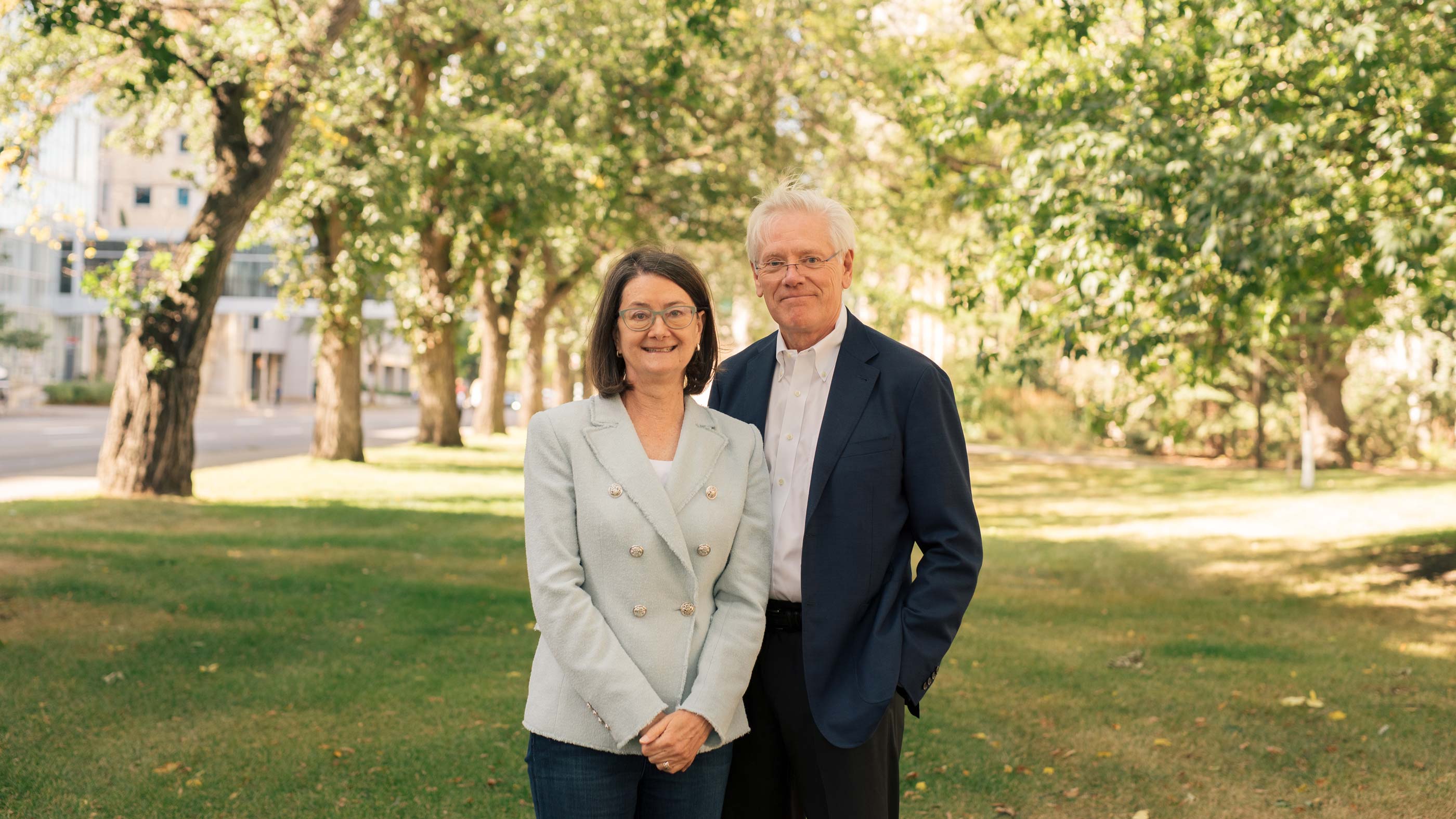Philanthropy Opens a World of Neurogenetics for a New Fellow at the University of Alberta
Mary Frances Hill - 14 December 2023

Oksana Suchowersky, ’73 BSc(Hons) and Chris Eagle
When you’re deeply curious and engaged, doors can open for you across the world — often in places you least expect.
The daughter of two mathematicians, Marta Villa Lopez grew up in Madrid, Spain. She has practiced as a neurologist in Spain, completed one fellowship in Toronto and collaborated on research in both the Canadian city and in Sweden. While those locales are exciting places for a neurologist to learn and work, it’s Edmonton and the U of A that have opened her eyes to a world that she’d never known, thanks to a fellowship generously funded by two of Alberta’s most prominent clinicians, Oksana Suchowersky, ’73 BSc(Hons), and her partner, Chris Eagle, chair of the board at the Alberta Cancer Foundation.
The one-year Dr. Oksana Suchowersky and Dr. Chris Eagle Clinical Fellowship provides up to $100,000 for training for exceptional clinical fellows who have completed residency in neurology or medical genetics. It allows trainees to build capacity and expertise in the areas of neurogenetics.
Just a few months into it, the experience is transforming Villa Lopez’s life and career, she says.
“When I started studying medicine, I knew I would go to something that had to do with the brain. There is so much to know and learn about it,” she says. “I’ve always been intrigued by it.”
The fellowship is awarded to University of Calgary and University of Alberta recipients in alternating years. The first award recipient, Xiao-Ru Yang, wrapped up her fellowship earlier this year at University of Calgary.
Both Eagle and Suchowersky know firsthand how vital fellowships can be to launch a career. Suchowersky says her own fellowship at the University of British Columbia (UBC) served as a catalyst for her, allowing her to dive into a neurogenetics subspecialty.
In a feat of perfect timing, Suchowersky completed a residency in neurology in 1983 — the same year scientists located the gene responsible for Huntington disease — at the same time as she began a fellowship at UBC, focusing on the diagnosis and treatment of patients with Huntington and other neurogenetic disorders.
Eagle, a professor and former head of Alberta Health Services, got his start with a Detweiler fellowship from the Royal College of Physicians and Surgeons of Canada that allowed him to study cardiac anesthesiology at the Mayo Clinic in the mid-1980s. Later, he received an honorary fellowship from the Australian and New Zealand College of Anesthetists.
The couple’s generous gift stems from their deep compassion for the next generation of clinical caregivers, and a shared optimism for the care of patients dealing with neurogenetic disorders such as Huntington, Parkinson and muscular dystrophy.
“Scientists are developing therapies that could someday modify the course of disease,” Suchowersky says. “And that would be life-changing for patients.”
The Power to Make a Difference
Over the last few decades, Suchowersky and Eagle have seen the landscape change drastically for medical students and residents.
As Suchowersky and Eagle were building their careers in the 1980s, Alberta hospitals, non-profit societies and the government could afford to be generous with funding for fellowships. But as the couple became respected mentors in their fields over the next several years, they couldn’t help but notice that the gradual fade of fellowship funding put the next generation of clinicians in a difficult spot.
“We both recognized in our different roles that it was becoming much harder for people finishing their residencies in Alberta to get the additional training they needed to become the high level of clinical specialists and researchers that are required,” says Eagle.
“We’ve watched people struggle to get that type of funding.”
A dearth of fellowship support contributes to the shortage of geneticists and neurogeneticists in the province (Suchowersky is Alberta’s sole neurogeneticist), putting pressure on patients and families. At the same time, neurogenetics and gene therapy are opening wide with possibilities and new opportunities in the treatment of disease, says Suchowersky.
Eagle says philanthropy has the power to make a difference in solving this complex issue.
“If you want things done better and faster, you have to figure out another way of funding. That’s where philanthropy comes in.”
Expanding Horizons in Clinical Care
At the U of A, Villa Lopez says working alongside Suchowersky has helped expose her to patients with conditions that she would not have often seen in her previous work in Spain, Sweden or Toronto.
"Practicing general neurology was satisfying and allowed me to assist patients, but it often involved more repetitive cases compared to the fellowship,” she says. “During my fellowship, I have the opportunity to expand my knowledge and expertise in neurogenetics."
Villa Lopez says she sees many families affected with neurogenetic disorders such as spinocerebellar ataxia, hereditary spastic paraplegia, Huntington disease and more. Some of these conditions are rare, “and I’m so grateful for the opportunity to see them with Dr. Suchowersky,” she says. “Seeing families affected by these disorders is definitely changing the way I approach my patients.”
The costs of getting through medical school and residency are a heavy burden, and a fellowship funds an extra year of specialization that some top residents might have to sacrifice in order to join the workforce earlier. The fellowship also trains talent that could help to establish the University of Alberta as a destination for clinical neurology.
Eagle says that witnessing the effect a fellowship can have on clinical care now — and recognizing the potential of today’s fellows in the future of neurogenetics at U of A — is immensely gratifying. When you become a philanthropist, he says, “you’ve opened the door for someone who is grateful for the opportunity, and you know that they’re going to do something that wouldn’t have happened without you.”